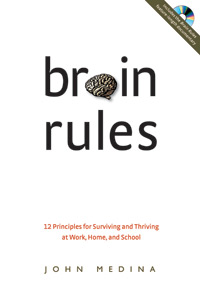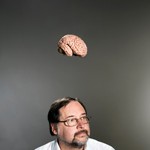Medina, John Brain Rules – 12 Principles for Surviving and Thriving at Work, Home and School, Pear Press Seattle, WA Copyright © 2008 by John J. Medina.
Wow – Yahoo – Holy smoke! An absolutely phenomenal book. Interesting and insightful — and practical – for all ages. Check out the website and all the YouTube videos as well.
John is a developmental molecular biologist and research consultant (I have no clue what that actually means other than he’s a lot smarter than I am). He’s also an affiliate Professor of Bioengineering at the University of Washington School of Medicine. In his spare time, (the guy doesn’t have really any does he?), John is the Director of the Brain Center for Applied Learning Research at Seattle Pacific University. (Makes my brain ache just thinking about all of the above).
This book is a true treasure (and so is Medina). Listen to the following tidbits before you run out and buy it:
“We are powerful and natural explorers and this never leaves us, despite the artificial environments we’ve built for ourselves.” P. 3.
“We are natural explorers, even if the habit sometimes stings us. The tendency is so strong, it is capable of turning us into lifelong learners.”
“Let’s look under the hood of an infant’s mind at the engine that drives its thinking processes and the motivating fuel that keeps its intellect running. This fuel consists of a clear, high –octane, unquenchable need to know. Babies are born with a deep desire to understand the world around them and an incessant curiosity that compels them to aggressively explore it. This need for explanation is so powerfully stitched into their experience that some scientists describe it as a drive, just as hunger and thirst and sex are drives.” Pp. 264-265
“Babies may not have a whole lot of understanding about their world, but they know a whole lot about how to get it.” P.269
We do not outgrow the thirst for knowledge.” P.270
“Our learning abilities don’t have to change as we age. We can remain lifelong learners.” P. 271
“Researchers have shown that some regions of the adult brain stay as malleable as a baby’s brain, so we can grow new connections, strengthen existing connections, and even create new neurons, allowing all of us to be lifelong learners.” P. 271
“But the adult brain also continues creating neurons within the regions normally involved in learning. These new neurons show the same plasticity as those of newborns. The adult brain throughout life retains the ability to change its structure and function in response to experience. P.271.
“For the little ones, discovery brings joy. Like an addictive drug, exploration creates the need for more discovery so that more joy can be experienced.” p. 273.
“If children are allowed to remain curious, they will continue to deploy their natural tendencies to discover and explore until they are 101.” P. 273
“We must do a better job of encouraging lifelong curiosity.” P. 274
Curious? Buy Brian Rules. If it’s true that you are what you eat, devour this book!




